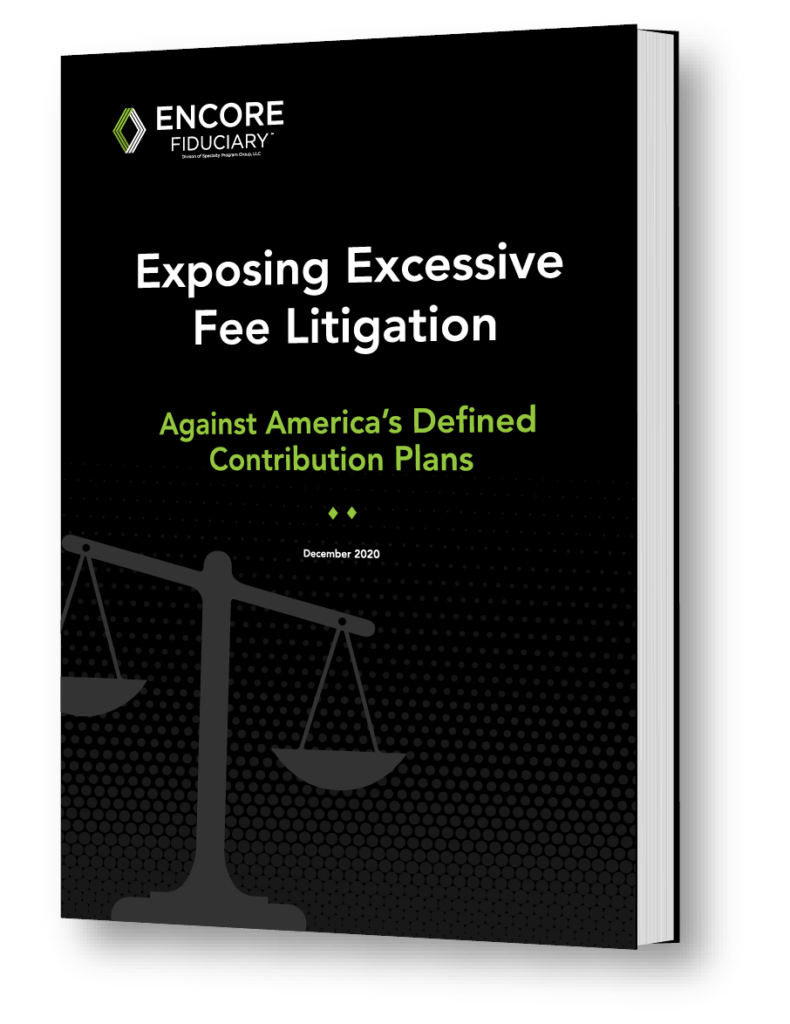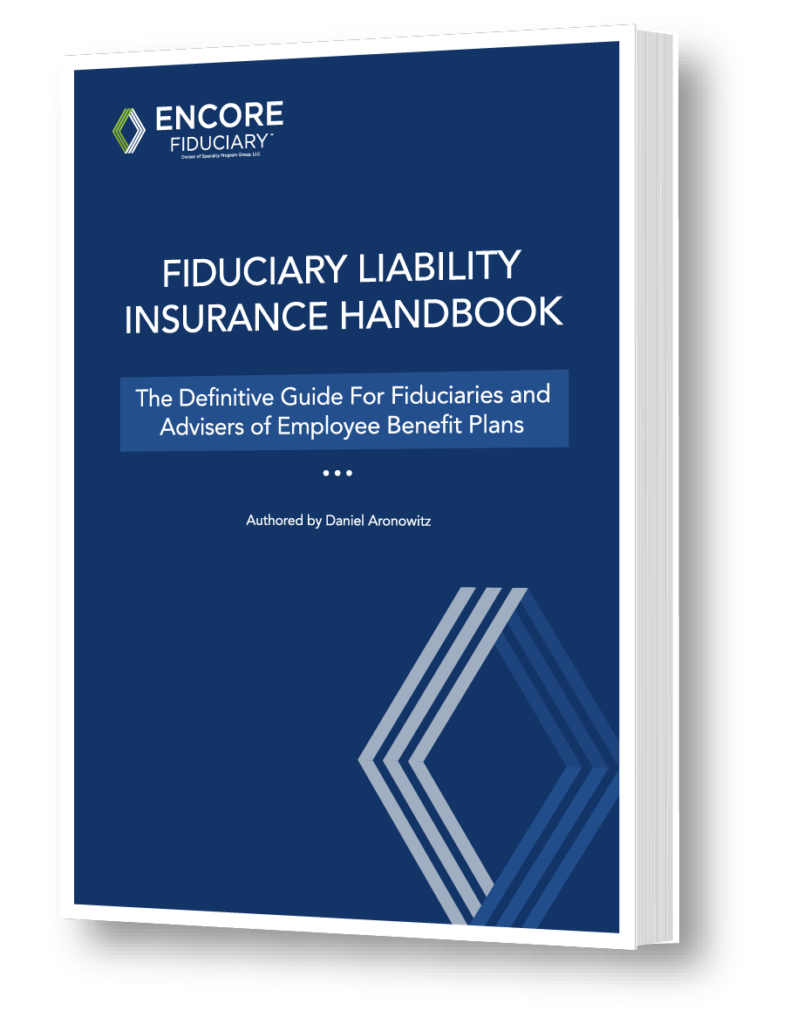The Supreme Court will hold oral argument in the Hughes v. Northwestern case on Monday, December 6. This is the most important case in the nearly fifty-year history of the Employee Retirement Income Security Act (ERISA), as it will decide the pleading standard for accusing plan fiduciaries of professional malpractice. We provided a preliminary in-depth analysis before the briefing [see here: https://encorefiduciary.com/wp-content/uploads/2021/08/Euclid-Specialty-The-Pleading-Standard-for-Excessive-Fee-Lawsuits_August-2021.pdf], and want to reiterate the main points of that analysis, as it was cited multiple times in Petitioners’ Reply Brief. As we advised in our whitepaper, “we believe the best strategy before the Supreme Court is for plan sponsors to be upfront that the Northwestern facts are suboptimal, yet that should not alter the need for a rigorous and predictable pleading standard for excessive fee cases.” As we head into oral argument, our advice has not changed. The goal for plan sponsors is to win the war, not just this individual battle, on excessive fee lawsuits. We need a more rigorous pleadings standard to divide “the plausible sheep from the meritless goats,” regardless of the final outcome in the Northwestern case.
The Schlichter Standard Versus the Euclid-Proposed McIntosh v. McIntosh Standard
Petitioners take the position that an excessive fee complaint meets the requirements of the federal rules of civil procedure if it contains “a short and plain statement of the claim showing that the pleader is entitled to relief.” Reply Brief 9. According to Petitioners, “an ERISA excessive-fee complaint passes muster if it contains sufficient factual allegations to support the reasonable inference that a fiduciary failed to act prudently to incur only reasonable expenses or failed to monitor the plan prudently to remove overly expensive investment options.” Reply Brief 10. They are asserting that a complaint meets the Rule 8(a) pleading requirement merely by asserting that plan fees are too high, or performance is too low.
The standard proposed by the Schlichter law firm is the bare minimum and would treat complex ERISA prudence challenges the same as a garden-variety auto accident case. This would allow participant class actions against nearly every retirement plan in the country. The only hurdle is to find a disgruntled employee to allege that recordkeeping or investment fees are too high, or that plan investments under-performed. The Schlichter standard requires no specific comparison to any reliable benchmark. Nor does it require a complaint to provide any meaningful context to allege professional malpractice. This empty standard is open season against plan fiduciaries.
Petitioners mock Northwestern’s argument that excessive fee litigation will “cripple ERISA plans” and “discourage employers from offering ERISA plans.” Reply Brief 22-23. They argue that most courts have allowed excessive-fee lawsuits like this one to advance, “yet none of the horribles prophesied by respondents has occurred.” Id. They argue that the number of ERISA plans has increased, and there is no evidence that any plan sponsor has terminated a plan based on excessive fee litigation fears. Petitioners further argue that only 350 out of nearly 700,000 plans have been sued in the last five years. But that is misleading. Like much of the excessive fee theories, context is necessary. Based on Plan Sponsor statistics from 2020, there are only 2,371 plans with assets over $250 million, which is the size at which most plans are at risk for legitimate excessive fee exposure [under the theory that excessive fee lawsuits are premised on the alleged failure to leverage size]. This means that as many as 15%+ of large plans have already been sued. This is hardly a de minimis impact. Based on what we can tell, plaintiff firms are actively investigating most large defined contribution plans in the country for potential lawsuits.
The Amicus Brief filed by the Chamber of Commerce demonstrates effectively why claims of fiduciary negligence based on circumstantial evidence cannot be treated the same as auto accidents or garden-variety negligence. Under ERISA, “process is king – ERISA simply requires fiduciaries to use a prudent process for making decisions.” Chamber Amicus Brief 9. As the Chamber explains, “ERISA class-action complaints, however, typically include no allegations about process and focus entirely on outcomes that the plaintiffs claim (with 20/20 hindsight) were suboptimal . . . Then they ask courts to infer from these outcomes that plan fiduciaries’ decision-making process must have been inadequate, and they seek hundreds of millions of dollars in ‘losses’ from the individuals serving as fiduciaries.” Id. Because excessive fee cases are based on circumstantial evidence, they cannot be treated like auto accidents or common negligence. Circumstantial allegations must be rigorously analyzed in context to incorporate the broad discretion and flexibility that ERISA fiduciary law affords plan fiduciaries.
The Amicus Brief filed by Euclid gives specific examples of the litigation abuse when courts adopt a lower pleading standard in ERISA cases. Euclid showed multiple examples of purported excessive fee claims based on recordkeeping fees in the 401k Averages Book to compare large plans against small plans. These cases mislead courts by omitting the significant revenue sharing of small plans, which would more accurately demonstrate that small plans have much higher plan fees than most large plans. In other cases, courts have used a lower pleading standard to allow allegations of excessive fees that purport to compare active funds to passive funds with completely different strategies and goals. In the Walgreens case, the court allowed an under-performance claim to proceed that involved super low-cost Northern Trust target-date funds based on misleading comparisons to other target-date funds with higher stock allocations, and thus higher performance. In the AT&T case, the district court allowed four successive complaints alleging excessive recordkeeping fees – all based on an incorrect and inflated recordkeeping fee that could immediately have been rebutted based on the Department of Labor required fee disclosures that every plan participant had received four times a year. The case was based on a false recordkeeping fee but was allowed to proceed to full discovery and likely millions in defense expenses. There is real cost and prejudice to allowing cases based on circumstantial evidence – and often false and misleading allegations – to proceed without a rigorous standard to protect plan fiduciaries.
As Euclid argued in its amicus brief, the pleading standard for excessive fee lawsuits ought to “readily divide the plausible sheep from the meritless goats.” Fifth Third Bancorp v. Dudenhoeffer, 573 U.S. 409, 425 (2014). Given the many false and misleading claims in excessive fee lawsuits, Euclid’s amicus brief advocated that the pleading standard for circumstantial ERISA claims should weed out the meritless claims by requiring lower courts to account for factors that demonstrate plausible claims of imprudence. Specifically, the pleading standard should focus on comparing the plan at issue with a reliable benchmark of materially identical investments and services. This would end the false comparisons of active to passive investments and misleading comparisons of investments with different investment strategies and objectives. Second, the pleading standard should be informed by factors that tend to indicate whether a reliable benchmark plan charges disproportionately lower fees compared to the fees charged by the plan at issue. As we argued, “[b]ecause plans have a wide variety of prudent investment options and services available, lower courts must do more than compare ‘apple to apples’; they must compare McIntosh to McIntosh and Red Delicious to Red Delicious.” Euclid Amicus at 5. The Euclid-proposed McIntosh to McIntosh standard is the only way to provide real justice for plan fiduciaries being accused of professional malpractice.
One final point deserves mentioning. Plaintiff law firms know that their complaints often do not allege anything about the actual fiduciary process. Instead, they try to side-step this deficiency by claiming that they do not have access to the fiduciary process, and thus need access to discovery to learn the actual fiduciary process. Euclid’s Amicus brief demonstrated the fallacy of this argument. As fiduciary underwriters, our goal is to provide fiduciary insurance to plans with fiduciary best practices. But like the plaintiffs’ bar, we often do not have access to plan minutes or interviews with plan fiduciaries. We discern fiduciary best practices by analyzing plan financials and DOL-mandated fee disclosures. Plaintiff lawyers have these same financials and participant disclosures, and should not be allowed to cry wolf that they need discovery before the district court can evaluate whether circumstantial allegations are plausible. For this reason, we advocated that courts should consider plan disclosures and public financial information when analyzing excessive fee lawsuits at the pleadings stage.
The Goal is to Win the War on Excessive Fees
Plan sponsors need the Supreme Court to institute a rigorous pleading standard before plaintiff law firms can file claims of excessive fee lawsuits. Claims of professional malpractice are serious allegations that deserve careful, context-based scrutiny before they should be allowed to proceed based on circumstantial evidence. As we have previously analyzed, Petitioners in the Northwestern case may have met even a more rigorous standard. They alleged that the recordkeeping fees were too high with revenue sharing and dual recordkeepers. We think that they failed to show how a $35 recordkeeping fee is the right target and alleged no other comparable university plan with a fee that low. The Complaint does cite five universities that allegedly consolidated to one recordkeeper, but does not give any context whether the resulting plan administration fees were lower for these plans. We think this is a serious deficiency, but it is more than most excessive fee complaints provide. The complaint also contains concerning allegations of 129 investment options with higher fee share classes, and we have always admitted that this fact pattern is hard to defend. The respondents and multiple amicus briefs have argued valiantly that Northwestern did nothing wrong. Even AARP argued in an amicus brief that its services are valuable and justify higher prices. The likely result is that the Supreme Court will set a more appropriate pleading standard, and then the case will be remanded to the district court to decide whether Northwestern fiduciaries met that standard. But the big picture is the pleading standard – not any one individual case.
Northwestern may ultimately lose this battle. But for plan sponsors, it is the war on excessive fees that matters. That starts with a more rigorous and appropriate context-based pleading standard in which many meritless goat excessive fee cases are dismissed at the pleadings stage.


